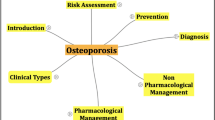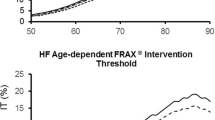Abstract
Summary
This analysis of National Health and Nutrition Examination Survey III data describes the prevalence of risk factors for osteoporosis and the proportions of men and postmenopausal women age 50 years and older who are candidates for treatment to lower fracture risk, according to the new FRAX®-based National Osteoporosis Foundation Clinician's Guide.
Introduction
Little information is available on prevalence of osteoporosis risk factors or proportions of US men and women who are potential candidates for treatment.
Methods
The prevalence of risk factors used in the new National Osteoporosis Foundation (NOF) FRAX®-based Guide to the Prevention and Treatment of Osteoporosis was estimated using data from the third National Health and Nutrition Examination Survey (NHANES III). Risk factors not measured in NHANES III were simulated using World Health Organization cohorts. The proportion of US men and postmenopausal women age 50+ years who are treatment candidates by the new NOF Guide were calculated; for non-Hispanic white (NHW) women, the proportion eligible by the new NOF Guide was compared with that based on an earlier NOF Guide.
Results
Twenty percent of men and 37% of women were potential candidates for treatment to prevent fractures by the new NOF Guide. Among NHW women, 53% were potential candidates by the previous NOF Guide compared with 41% by the new guide.
Conclusions
One fifth of men and 37% of postmenopausal women are eligible for osteoporosis treatment consideration by the new NOF Guide. However, fewer NHW women are eligible by the new guide than by the previous NOF Guide.



Similar content being viewed by others
References
Gehlbach SH, Avrunin JS, Puleo E (2007) Trends in hospital care for hip fractures. Osteoporos Int 18:585–591
Melton LJ 3rd, Kearns AE, Atkinson EJ, Bolander ME, Achenbach SJ, Huddleston JM, Therneau TM, Leibson CL (2009) Secular trends in hip fracture incidence and recurrence. Osteoporos Int 20:687–694
Burge R, Dawson-Hughes B, Solomon DH, Wong JB, King A, Tosteson A (2007) Incidence and economic burden of osteoporosis-related fractures in the United States, 2005–2025. J Bone Miner Res 22:465–475
National Osteoporosis Foundation (2008) Clinician's Guide to Prevention and Treatment of Osteoporosis. National Osteoporosis Foundation, Washington, D C, pp 1–36
Kanis J (2008) Assessment of osteoporosis at the primary health-care level. WHO Collaborating Centre, University of Sheffield, Sheffield, UK In Group WHOS
Tosteson AN, Melton LJ 3rd, Dawson-Hughes B, Baim S, Favus MJ, Khosla S, Lindsay RL (2008) Cost-effective osteoporosis treatment thresholds: the United States perspective. Osteoporos Int 19:437–447
National Osteoporosis Foundation (2005) Physician's guide to prevention and treatment of osteoporosis. National Osteoporosis Foundation, Washington, DC
Eddy DM, Johnston CC Jr, Cummings SR (1998) Osteoporosis: review of the evidence for prevention, diagnosis and treatment and cost-effectiveness analysis. Osteoporos Int 8:S1–S88
Gunter EW, Lewis BG, Koncikowski SM (1996) Laboratory procedures used for the third National Health and Nutrition Examination Survey (NHANES III), 1988-1994. In Services DoHaH (ed). Center for Disease Control and Prevention, Atlanta, GA
(1977) Standards and guidelines for federal statistics: race and ethnic standards for federal statistics and administrative reporting. In Budget OoMa (ed). Federal Register.
Wahner HW, Looker A, Dunn WL, Walters LC, Hauser MF, Novak C (1994) Quality control of bone densitometry in a national health survey (NHANES III) using three mobile examination centers. J Bone Miner Res 9:951–960
Looker AC, Wahner HW, Dunn WL, Calvo MS, Harris TB, Heyse SP, Johnston CC Jr, Lindsay R (1998) Updated data on proximal femur bone mineral levels of US adults. Osteoporos Int 8:468–489
McKinlay SM (1994) Issues in design, measurement, and analysis for menopause research. Exp Gerontol 29:479–493
Denniston PL, Epner JA (1993) 1993 physicians' GenRx. Data Pharmaceutica, New York
Hansen MA, Overgaard K, Riis BJ, Christiansen C (1991) Potential risk factors for development of postmenopausal osteoporosis—examined over a 12-year period. Osteoporos Int 1:95–102
Rasch EK, Hirsch R, Paulose-Ram R, Hochberg MC (2003) Prevalence of rheumatoid arthritis in persons 60 years of age and older in the United States: effect of different methods of case classification. Arthritis Rheum 48:917–926
Helmick CG, Felson DT, Lawrence RC, Gabriel S, Hirsch R, Kwoh CK, Liang MH, Kremers HM, Mayes MD, Merkel PA, Pillemer SR, Reveille JD, Stone JH (2008) Estimates of the prevalence of arthritis and other rheumatic conditions in the United States. Part I. Arthritis Rheum 58:15–25
Kanis JA, Oden A, Johnell O, Johansson H, De Laet C, Brown J, Burckhardt P, Cooper C, Christiansen C, Cummings S, Eisman JA, Fujiwara S, Gluer C, Goltzman D, Hans D, Krieg MA, La Croix A, McCloskey E, Mellstrom D, Melton LJ 3rd, Pols H, Reeve J, Sanders K, Schott AM, Silman A, Torgerson D, van Staa T, Watts NB, Yoshimura N (2007) The use of clinical risk factors enhances the performance of BMD in the prediction of hip and osteoporotic fractures in men and women. Osteoporos Int 18:1033–1046
Ettinger D, Black D, Dawson-Hughes B, Pressman AR, Melton LJ (2009) Updated fracture incidence rates for the U.S. version of FRAXR. Osteoporos Int doi:10.1007/s00198-009-1032-9
Montori VM, Guyatt GH (2001) What is evidence-based medicine and why should it be practiced? Respir Care 46:1201–1214
O'Connor AM, Wennberg JE, Legare F, Llewellyn-Thomas HA, Moulton BW, Sepucha KR, Sodano AG, King JS (2007) Toward the ‘tipping point’: decision aids and informed patient choice. Health Aff (Millwood) 26:716–725
Curtis JR, Carbone L, Cheng H, Hayes B, Laster A, Matthews R, Saag KG, Sepanski R, Tanner SB, Delzell E (2008) Longitudinal trends in use of bone mass measurement among older Americans, 1999–2005. J Bone Miner Res 23:1061–1067
Vasan RS, Beiser A, Seshadri S, Larson MG, Kannel WB, D'Agostino RB, Levy D (2002) Residual lifetime risk for developing hypertension in middle-aged women and men: the Framingham heart study. JAMA 287:1003–1010
Donaldson MG, Cawthon PM, Lui LY, Schousboe JT, Ensrud KE, Taylor BC, Cauley JA, Hillier TA, Black DM, Bauer DC, Cummings SR (2009) Estimates of the proportion of older white women who would be recommended for pharmacologic treatment by the new U.S. national osteoporosis foundation guidelines. J Bone Miner Res 24:675–680
Dawson-Hughes B, Harris SS, Dallal GE, Lancaster DR, Zhou Q (2002) Calcium supplement and bone medication use in a US medicare health maintenance organization. Osteoporos Int 13:657–662
Lee E, Wutoh AK, Xue Z, Hillman JJ, Zuckerman IH (2006) Osteoporosis management in a Medicaid population after the Women's Health Initiative study. J Womens Health (Larchmt) 15:155–161
Tosteson AN, Grove MR, Hammond CS, Moncur MM, Ray GT, Hebert GM, Pressman AR, Ettinger B (2003) Early discontinuation of treatment for osteoporosis. Am J Med 115:209–216
Solomon DH, Avorn J, Katz JN, Finkelstein JS, Arnold M, Polinski JM, Brookhart MA (2005) Compliance with osteoporosis medications. Arch Intern Med 165:2414–2419
Feldstein AC, Schneider J, Smith DH, Vollmer WM, Rix M, Glauber H, Boardman DL, Herson M (2008) Harnessing stakeholder perspectives to improve the care of osteoporosis after a fracture. Osteoporos Int 19:1527–1540
Kiebzak GM, Beinart GA, Perser K, Ambrose CG, Siff SJ, Heggeness MH (2002) Undertreatment of osteoporosis in men with hip fracture. Arch Int Med 162:2217–2222
Cadarette SM, Katz JN, Brookhart MA, Levin R, Stedman MR, Choudhry NK, Solomon DH (2008) Trends in drug prescribing for osteoporosis after hip fracture, 1995–2004. J Rheumatol 35:319–326
Hedley AA, Ogden CL, Johnson CL, Carroll MD, Curtin LR, Flegal KM (2004) Prevalence of overweight and obesity among US children, adolescents, and adults, 1999–2002. JAMA 291:2847–2850
Looker AC, Pfeiffer CM, Lacher DA et al (2008) Serum 25-hydroxyvitamin D status of the US population: 1988–1994 compared with 2000–2004. Am J Clin Nutr 88:1519–1527
Conflicts of interest
None.
Author information
Authors and Affiliations
Corresponding author
Additional information
This material is based upon work supported by the US Department of Agriculture, Agricultural Research Service, under agreement no. 58-1950-7-707. Any opinions, findings, conclusion, or recommendations expressed in this publication are those of the author(s) and do not necessarily reflect the view of the US Dept of Agriculture, the Centers for Disease Control and Prevention, or the US Department of Health and Human Services.
Rights and permissions
About this article
Cite this article
Dawson-Hughes, B., Looker, A.C., Tosteson, A.N.A. et al. The potential impact of new National Osteoporosis Foundation guidance on treatment patterns. Osteoporos Int 21, 41–52 (2010). https://doi.org/10.1007/s00198-009-1034-7
Received:
Accepted:
Published:
Issue Date:
DOI: https://doi.org/10.1007/s00198-009-1034-7




